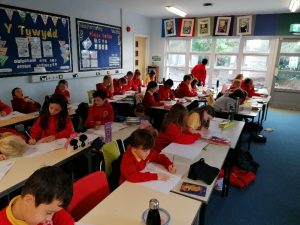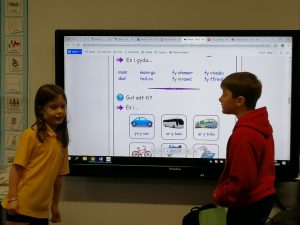Click on the image to watch a short animation.


Click on the image to see the different programmes available this week. You can watch them on the CBBC Channel live or play back later on the BBC iPlayer. In addition, there are Bitesize activities for different age groups and subjects. https://www.bbc.co.uk/bitesize/learn
Numeracy
We have focussed on developing our addition skills in numeracy this month. Indeed, we began by using physical resources to support addition sums. We used dienes, Numicon and Cuisenaire and discussed the advantages and disadvantages of each. The learners decided that the dienes were better for 3, 4 and 5-digit numbers, whereas they preferred the Numicon and Cuisenaire for lower value numbers. Next, we looked at representing worded questions pictorially using the Bar Model method. This required the children to read questions carefully, represent the information in a bar model, and then calculate the sum. Finally, we moved on to a formal written method. The children excelled at using the column method, thanks mainly to the understanding gained from using the physical resources and bar models previously. Many learners were able to complete 5 and even 6-digit addition using the column method, which is a Year 5 skill! Next, we are exploring subtraction, which is the inverse operation to addition. We will follow a similar pattern of physical resources, pictorial representation and finishing with a formal written method. To support your children at home, keep practising those multiplication tables. Also, try to incorporate addition and subtraction sums into conversation.

Literacy
Our literacy focus this month has been the past tense. We focussed on this skill because many of the children write how they talk, which often is not grammatically correct. We began by exploring the rules for changing words into the past tense, for example some words we add the suffix ‘ed’ and some words we replace a ‘y’ with ‘ied’. The children coped well with the different rules and all enjoyed participating in a Who Wants to be a Millionaire style quiz that checked their understanding. Then, the learners initially changed sentences from the present tense into the past tense, building up to changing whole paragraphs.
We focussed on the past tense in our oracy work too, in order to support our writing. The children retold the key events of our class story to a friend from the perspective of Hassan. The children also discussed what they did over the weekend and wrote this in both English and Welsh.

In guided reading sessions, we have been focussing on Empathy. This has required the learners to consider the feelings of Hassan, the main character in our class book, at different parts of the story. The children have blown me and Miss Willimer away with their responses. Moving forward, the children will be writing from the perspective of Hassan, as if telling a friend what happened to him in Somalia.
Health and Well-being
This month we have focussed on developing and understanding Empathy. This fitted in perfectly with Anti-bullying week as we were able to discuss the feelings of children in different scenarios, as well as the feelings of the teachers. We started by discussing what empathy is and why it is important. Then we used stories and characters to help discuss empathy as this is a safe starter for children to discuss feelings, because it is not them in that situation. The hope is, this will lead to children being more open to share their own feelings and have a better understanding of how others feel. In turn, allowing for them to act in a way that respects how others may feel.

As part of our understanding of Empathy, we learned how to sign the alphabet. The children had great joy in learning to sign their names and started to sign more complicated words. This gave the children a glimpse into how Hassan would be feeling going to a country where he didn’t speak the language. The children also thoroughly enjoyed creating their own signs to support a new child in our class who couldn’t speak English.
DCF
I try to incorporate digital learning into learning experiences whenever possible.
During Anti-bullying week we discussed cyber-bullying and how we can stay safe online. The learners were able to create their own Top Tips for dealing with cyber-bullying and Anti-bullying posters.
The learners have utilised their Hwb skills, to retrieve work shared with them, complete the task, and then share it with their partner and myself. In order to complete these tasks, the learners have also used their online research skills. We were able to discuss reliable and unreliable sources.